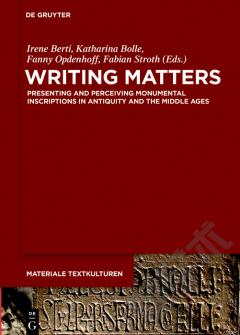Viewing Inscriptions in the Late Antique and Medieval World
Inscriptions convey meaning not just by their contents but also by other means, such as choice of script, location, scale, spatial organisation, letterform, legibility and clarity. The essays in this book consider these visual qualities of inscriptions, ranging across the Mediterranean and the Near East from Spain to Iran and beyond, including Norman Sicily, Islamic North Africa, Byzantium, medieval Italy, Georgia and Armenia. While most essays focus on Late Antiquity and the Middle Ages, they also look back at Achaemenid Iran and forward to Mughal India. Topics discussed include real and pseudo-writing, multilingual inscriptions, graffiti, writing disguised as images and images disguised as words. From public texts set up on mountainsides or on church and madrasa walls to intimate craftsmen's signatures, barely visible on the undersides of precious objects, the inscriptions discussed in this volume reveal their meanings as textual and visual devices.
{{comment.content}}








 京公网安备 11010802027623号
京公网安备 11010802027623号